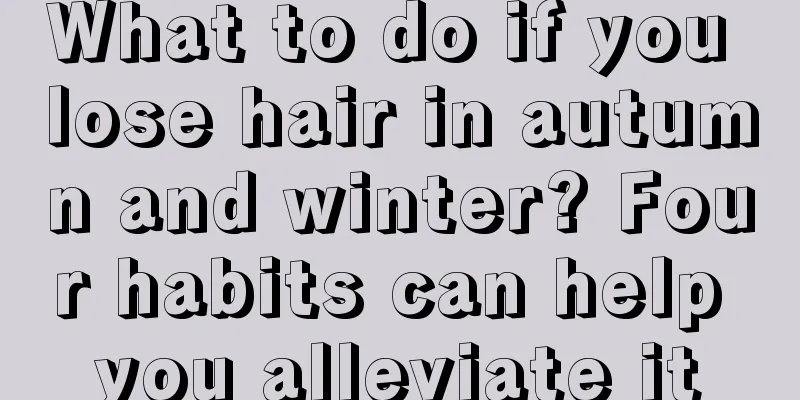What to do if you lose hair in autumn and winter? Four habits can help you alleviate it

|
Hair loss is also seasonal, and some people experience particularly severe hair loss in autumn and winter. To alleviate this situation, you can adjust your personal habits, first the frequency of shampooing, then massage your hair, and also get enough sleep and a scientific diet. 1. Set your personal shampooing frequency. Many people like to wash their hair frequently, which is not conducive to hair care. The frequency of shampooing can be slightly higher in summer because there is more sweating and sebum secretion in summer. The shampooing cycle can be appropriately extended in autumn and winter to 1-2 times a week. People with different hair types have different shampooing frequencies. For dry hair, wash once a week; for oily hair, wash twice a week. Shampoo should also be selected according to hair type. Dry hair can use mild nourishing shampoo, while oily hair should use shampoo with stronger detergency. 2. Daily head massage. Protecting hair should start from daily life. Use appropriate amount of hair lotion after shampooing or daily to replenish hair nutrition and moisture. At the same time, massage the head frequently for 5-10 minutes each time to promote blood circulation and increase hair nutrition. You can comb your hair every morning and evening, which can not only make your hair fluffy, but also facilitate the breathing and metabolism of the scalp and hair, and promote healthy hair growth. 3. Adequate sleep and optimistic mood. Hair is closely related to psychological factors. Mental tension and excessive stress can lead to and aggravate hair loss. Once hair loss occurs, it causes both physical and psychological obstacles to patients. Overcoming and correcting negative emotions is often not to be underestimated in the treatment of hair loss, and even plays a decisive role, because psychoneurological factors can lead to autonomic dysfunction and induce or aggravate hair loss. 4. Scientific diet. In addition to actively cooperating with the doctor's treatment, people with hair loss should also pay attention to the scientific nature of their diet. For example, excessive consumption of sweets, beverages, fried foods, chocolate, coffee, cream and other fat-rich products will lead to excessive sugar in the body, causing fat metabolism disorders and excessive sebum secretion, affecting the hair. Spicy foods such as peppers, chives, garlic, mustard, and alcoholic beverages can also irritate the scalp, causing or aggravating scalp itching and hair loss. |
<<: What is the difference between rheumatism and rheumatoid arthritis?
>>: What to do when hair is falling out due to stress, how to adjust your mentality
Recommend
What is the cause of big toe pain
In fact, foot bones are also very important for p...
How about highland barley wine
Highland barley wine is brewed from highland barl...
How to wash a down jacket with oil stains
We all know that down jackets are difficult to wa...
How can I fall asleep quickly?
Lack of sleep not only affects tomorrow's wor...
What are the steps and time for orthodontic treatment?
Teeth are a very important part of the human body...
How long after teratoma surgery can I resume normal activities and exercise
It usually takes 6 to 8 weeks after teratoma surg...
What are the methods to remove acne marks and acne pits
For those of us who live in a materially abundant...
The effects and functions of red guava
Red guava is a variety of pomegranate. It has hig...
How to care for a hamartoma
Although hamartoma is not a particularly serious ...
In summer, spleen and stomach health is the top priority, diet should also prevent diarrhea
The climate is hot in summer, and a large amount ...
What should I do if I accidentally ingest mercury
Mercury is a toxic substance, which is the common...
What are the tips for traveling during the National Day holiday?
During the seven-day National Day holiday every y...
Pat the outer thigh
There are many meridians on the outer side of the...
What is the reason for the pain next to the belly button
Sometimes people will feel severe pain near their...
Symptoms of advanced cardia cancer
If cardia cancer is not treated in time, it will ...









